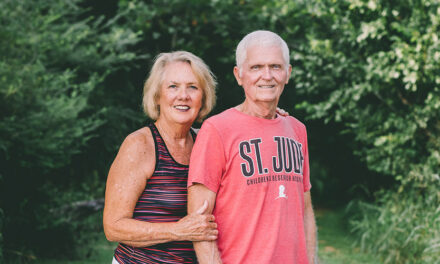When speaking with Dr. Katie Montry, her passion is health — mentally, through her career as a neuropsychologist, and physically, through her work inspiring fitness in the Memphis community.
Katie has always been interested in the brain and body connection and has made it her life’s work to be a resource for mental and physical health. Originally from Detroit, she grew up a sporty kid who loved learning about the brain and its workings. She eventually received her Bachelor of Science in Neuroscience from the University of Michigan, then her Master’s and Doctorate in Neuropsychology from Rosalind Franklin University in Chicago. Katie found her way to Memphis during her residency work and has been a clinical neuropsychologist at Semmes Murphey for four years. Through her work, Katie focuses on brain health. She specializes in checking memory, attention, and other areas of thinking for her patients, who are often referred to her if they are experiencing cognitive or behavioral changes. In addition, Katie works with patients recovering from traumatic brain injuries, and started a Memory Clinic at Semmes Murphey, where she serves as co-director. If she does not sound busy enough, Katie also serves as a CrossFit trainer and 901 Volleyball tournament manager.
When Katie found out she matched in Memphis for her residency, she immediately began searching online for any recreational sports teams she could join to meet friends in her new city. “I quickly joined the Facebook group for 901 Volleyball, recruited free agents to have a team, and had a built-in group of friends from pretty much the moment I moved to Memphis. Now, almost all my friends here have been through volleyball and CrossFit,” she says. As 901 Volleyball tournament manager, she organizes over 1000 tournament participants for beach, indoor, and grass games and spearheads advertising, recruiting, and fundraising.
Also active with the CrossFit community, Katie says, “Women are taught not to lift heavy, so when I started doing CrossFit, I loved watching strong women lifting huge weights and seeing how well my body responded to that type of workout. It has changed my relationship with my body, allowing me to focus on what it can do rather than what it looks like,” she says. As a CrossFit coach at CrossFit Hit And Run, Katie loves to see the same change in her trainees as their passion for weightlifting grows.
Katie also brings her passion for exercise and fitness into her work with her patients at Semmes Murphey. “A lot of my work is with the aging population and those with dementia, and I always emphasize the importance of exercise,” she says. She reminds her patients of the importance of cardio, weightlifting, stretching, flexibility, and the ability to pick yourself up after a fall. “If I have a senior patient that can do a burpee, I am much less concerned about them,” Katie says. It is clear through her work and fitness hobbies that Katie is passionate about keeping the Memphis community healthy and active — mentally and physically.
To learn more about 901 Volleyball, visit 901volleyball.volleyballlife.com.
Visit Cfhitandrun.com to learn more about CrossFit Hit And Run.

DR. KATIE MONTRY PROVIDED SOME INSIGHT INTO THE COGNITIVE IMPAIRMENT THAT CAN OCCUR IN CANCER PATIENTS.
WHAT IS CANCER- RELATED COGNITIVE IMPAIRMENT (CRCI)? DO PEOPLE WITH BREAST CANCER AND BREAST CANCER SURVIVORS EXPERIENCE IT?
CRCI refers to changes in thinking associated with cancer itself or its treatments. Research has shown that anywhere between 13-70% of people with breast cancer and breast cancer survivors experience CRCI, with some of the most reported symptoms including changes in learning and memory, difficulties focusing and distractibility, and word-finding problems.
IS CRCI SEEN MORE OFTEN BEFORE DIAGNOSIS, DURING TREATMENT, OR AFTER TREATMENT HAS ENDED?
Everyone’s experience with CRCI is different. Studies have found that CRCI can occur at multiple stages in the breast cancer journey, including both during and immediately after treatment and sometimes even after a more extended period after completion of treatment. Many people will report that their cognitive symptoms improve after they’ve completed treatment, while others may notice persisting symptoms long after their treatment concludes.
WHAT ARE THE CAUSES OF THESE SYMPTOMS?
While we don’t fully understand what causes CRCI among people with breast cancer and survivors of breast cancer, the current research suggests that multiple factors likely contribute to its onset and persistence over time. These factors may include both the direct and indirect effects of cancer therapies on the central nervous system, lifestyle factors such as diet and exercise, and other biopsychosocial factors such as psychological distress, fatigue, and sleep disturbance.
WHAT ARE SOME SOLUTIONS TO THESE SYMPTOMS, BOTH IN THE SHORT- AND LONG-TERM?
Start by talking to your doctor. They may be able to immediately identify and address more easily treatable issues that could be contributing to CRCI, such as some treatment-related side effects, difficulties sleeping, or changes in your diet and exercise habits. They will also be able to refer you to mental health professionals who can help you manage psychological symptoms very commonly associated with the diagnosis and treatment of breast cancer, including stress, anxiety, and depression. You might also ask your doctor whether a referral for neuropsychological evaluation would be appropriate to identify and characterize any cognitive or behavioral changes associated with your diagnosis and treatment and to make recommendations regarding the management of any factors potentially contributing to your symptoms.
IS THERE ANY ADVICE YOU WOULD GIVE TO PATIENTS NEWLY DIAGNOSED WITH BREAST CANCER TO HELP PREVENT OR ALLEVIATE CRCI?
Maintain regular physical activity under the advisement of your treating doctors. Exercise, including aerobic exercise, resistance training, and yoga, can be helpful in preventing or reducing the severity of cognitive symptoms. Work with your doctors to optimize your sleep quality to reduce fatigue and improve your cognitive efficiency during the day. Maintain a balanced diet. The Mediterranean diet, DASH (Dietary Approaches to Stop Hypertension) diet, and the MIND diet (a combination of the Mediterranean and DASH diets) have the most research support in reducing the risk of cognitive decline over time. Keep your brain active, socialize with friends and family, learn something new, and keep up with your hobbies to the best of your ability. Lastly and most importantly, seek professional help. Receiving a cancer diagnosis can be extremely scary and stressful. Working with a psychologist or therapist and attending support groups can be very helpful in managing stress and preventing more significant symptoms of anxiety, depression, and trauma-related conditions that may contribute to cognitive symptoms and negatively affect your quality of life.”
By Zoe Harrison







